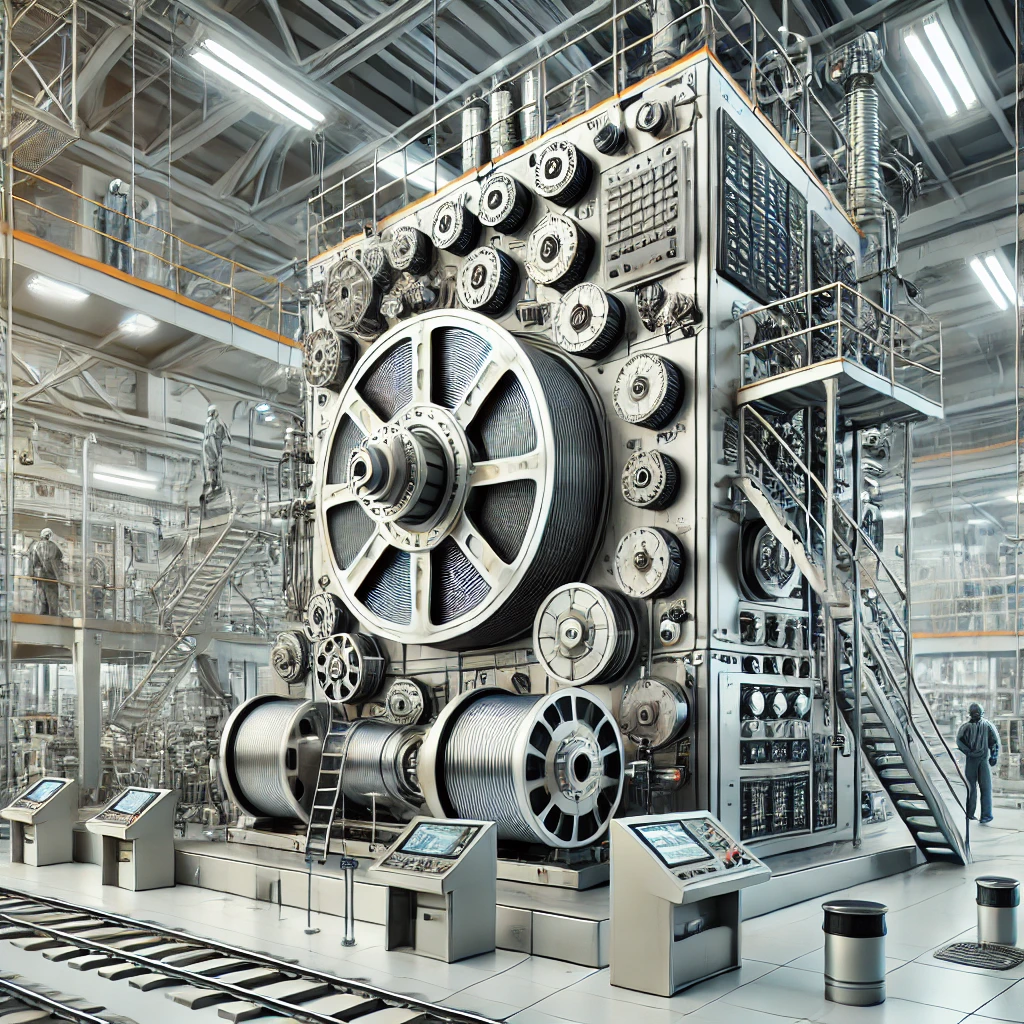In the modern world of manufacturing, automation is the key to efficiency, precision, and scalability. Among the many sophisticated tools that industries rely on, winding machines hold a critical place. These machines are designed to wind various materials, such as wire, yarn, or even film, in a controlled and systematic manner, ensuring uniformity, speed, and accuracy. A winding machine manufacturer plays a pivotal role in producing these essential machines, catering to diverse industries like textiles, electronics, and power generation.
The growing demand for quality winding machines has made the role of a winding machine manufacturer more important than ever before. The following article explores the significance of these manufacturers, their technological advancements, and their contributions to various industries.
The Importance of Winding Machines in Manufacturing
Winding machines are essential for industries that require precise coiling of materials onto spools, bobbins, or reels. These machines ensure that the material is wound in a uniform manner, maintaining consistent tension, which is crucial for maintaining product quality. For example, in the electrical industry, wire winding is necessary for the production of motors, transformers, and inductors, while in the textile industry, yarn winding is essential for creating quality fabrics.
A winding machine manufacturer focuses on designing and producing equipment that can handle these diverse winding requirements. Manufacturers must meet industry-specific standards, offering machines that can perform with high precision, operate at varying speeds, and handle different materials effectively.
Types of Winding Machines
The range of winding machines produced by a winding machine manufacturer is vast. Each type of machine serves specific industrial needs, which makes it essential for manufacturers to offer a wide variety of machines. The most common types include:
Coil Winding Machines
Coil winding machines are used extensively in the electrical and electronics industry. These machines wind wire into coils, which are then used in motors, transformers, solenoids, and other electrical devices. The precision of coil winding is crucial for ensuring the proper functioning of these devices. A winding machine manufacturer ensures that these machines can handle different types of wire gauges and offer customization options based on specific industry needs.
Yarn Winding Machines
In the textile industry, yarn winding is a fundamental process in fabric production. Yarn winding machines are designed to coil yarn onto spools or cones, preparing it for weaving or knitting. The role of a winding machine manufacturer in this sector is to provide machines that ensure the yarn is wound uniformly, maintaining the right tension to prevent breakage during the subsequent stages of fabric production.
Film Winding Machines
Film winding machines are used to wind various types of plastic films, foils, or sheets in industries such as packaging, printing, and manufacturing. A winding machine manufacturer in this space focuses on machines that can handle delicate materials and ensure proper alignment and tension to prevent any damage or wrinkles in the film.
Technological Advancements in Winding Machines
As industries evolve, the role of a winding machine manufacturer has expanded beyond simply providing basic winding equipment. With advancements in automation and control systems, modern winding machines are equipped with features that offer greater precision, speed, and flexibility. Some of the key advancements include:
Automated Winding Machines
Automation has revolutionized the winding process. Modern winding machines are now equipped with programmable logic controllers (PLCs) and computer numerical control (CNC) systems, allowing for fully automated operations. These machines can adjust winding speed, tension, and patterns automatically, reducing the need for manual intervention. A winding machine manufacturer offering automated machines enables industries to achieve higher efficiency, reduce errors, and maintain consistent product quality.
Multi-Axis Control
Advanced winding machines feature multi-axis control, which allows for more complex winding patterns. This is particularly important in industries like electronics, where coil winding patterns must be precise to ensure the optimal performance of components like transformers and inductors. By incorporating multi-axis control technology, a winding machine manufacturer ensures that their machines can meet the growing demand for complex and high-precision winding tasks.
Tension Control Systems
Maintaining consistent tension during the winding process is crucial, especially for delicate materials like fine wire or yarn. Modern winding machines are equipped with advanced tension control systems that automatically adjust the tension based on the material being wound. A winding machine manufacturer with expertise in tension control technology ensures that their machines can handle a wide range of materials without causing damage or affecting the quality of the final product.
Integration with Industry 4.0
The integration of Industry 4.0 technologies, such as IoT and machine learning, has further enhanced the capabilities of winding machines. These technologies allow machines to communicate with other equipment on the production floor, monitor performance in real-time, and make data-driven adjustments to optimize the winding process. A forward-thinking winding machine manufacturer that embraces Industry 4.0 offers machines that can provide real-time data analytics, predictive maintenance, and seamless integration into a smart factory environment.
Customization and Flexibility
One of the key roles of a winding machine manufacturer is to provide customized solutions that meet the unique needs of different industries. Whether it is winding wire for a high-power transformer or delicate yarn for high-end textiles, the ability to customize machines based on the specific requirements of the material and application is crucial.
Customization may involve adjusting the winding speed, tension, or spool size, or even incorporating specific features such as automatic loading and unloading systems. A winding machine manufacturer that offers flexibility in their machine designs can cater to industries with diverse needs, ensuring that each customer gets the most efficient solution for their particular winding application.
The Role of Quality in Winding Machine Manufacturing
The quality of the machines produced by a winding machine manufacturer is critical to the success of the industries they serve. Poorly designed or constructed machines can result in inconsistent winding, material damage, and downtime, which can have a significant impact on production efficiency and costs.
A reputable winding machine manufacturer invests in high-quality materials, precision engineering, and rigorous testing to ensure that their machines meet the highest standards. These manufacturers also provide ongoing support and maintenance services to ensure that their machines continue to operate at peak performance throughout their lifespan.
Applications of Winding Machines in Various Industries
The versatility of winding machines means that they are used in a wide range of industries, each with its own specific needs. A winding machine manufacturer must be able to produce machines that can handle the unique requirements of each industry. Some of the key industries that rely on winding machines include:
Electrical and Electronics Industry
Winding machines are essential for the production of electrical components such as transformers, motors, and solenoids. In this industry, precision and consistency are paramount, as any errors in the winding process can result in component failure. A winding machine manufacturer serving this industry must offer machines that can handle fine wire gauges, maintain consistent tension, and produce high-precision coils.
Textile Industry
The textile industry relies on yarn winding machines to prepare yarn for weaving or knitting. A winding machine manufacturer catering to this industry must ensure that their machines can handle a wide variety of yarn types and sizes, maintaining consistent tension to prevent breakage and ensuring that the yarn is wound evenly onto spools or cones.
Packaging Industry
In the packaging industry, film winding machines are used to wind plastic films, foils, or sheets. These machines must be able to handle delicate materials without causing wrinkles or damage. A winding machine manufacturer focused on this sector must offer machines with advanced tension control and alignment systems to ensure the smooth winding of films.
Conclusion
In today’s highly competitive and technology-driven manufacturing landscape, the role of a winding machine manufacturer is more important than ever. By providing customized, high-precision machines equipped with the latest automation and control technologies, these manufacturers help industries achieve greater efficiency, consistency, and product quality.
Whether it is winding delicate yarn for textiles or fine wire for electrical components, a winding machine manufacturer plays a critical role in ensuring that the winding process is smooth, efficient, and precise. As industries continue to evolve, the demand for advanced winding machines will only grow, making these manufacturers key players in the future of industrial automation.


